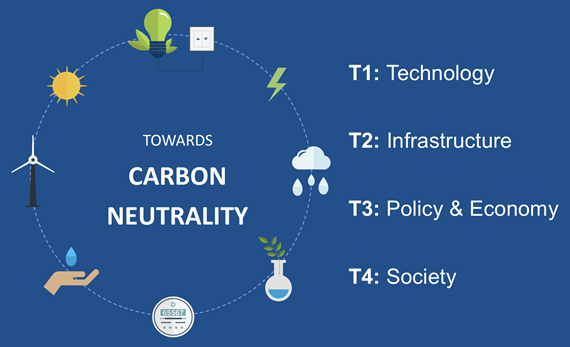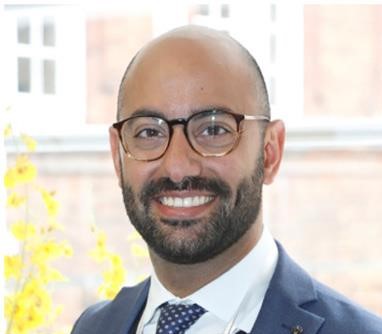The global movement towards lower carbon emissions is materializing in the form of pledges by companies and governments to become “Carbon Neutral”. While the main and direct benefits of a carbon-neutral future are the anticipated reductions in Greenhouse Gas Emissions, indirect benefits and payoffs are numerous, including improved air quality, reduced healthcare costs, job creation, and improvements in the overall quality of life among others. Despite the anticipated benefits and global push towards carbon neutrality, it was only recently that GCC countries released statements in the form of pledges in that regard. Such positions were taken just before the 26th UN Climate Change Conference (COP26) for the most part and varied in their level of commitment. Numerous barriers are believed to hinder such commitments but have not been fully studied in the literature. The goal of this workshop is to explore the current state, opportunities, and challenges related to a carbon-neutral future for the GCC states. It aims to attract participants from diverse disciplines and sectors such as policymakers, engineers, educators, researchers and innovators, and experts in relevant fields. The resulting exchange of knowledge is integral to a better and clearer understanding of the challenges ahead of Gulf countries in their pursuit of a less carbon-intensive future.
3 DAYS / 12 Workshops
MORE THAN 300 ACADEMIC PAPERS
CO2 emissions have risen by 1% per year on average since 2010 (International Renewable Energy Agency, 2020). Despite the fact that energy-related CO2 emissions may have declined in 2020 due to the COVID-19 pandemic and the fall in oil price, a rebound would restore such a long-term trend. In this context, governments throughout the world are facing significant challenges related to the sustainability of their various sectors such as buildings, transportation, industrial, healthcare, and education. With worldwide population growth, there is a growing stress on essential resources, such as energy, water, and food, leading to a significant Carbon footprint on the natural environment. GCC countries are at the front line of such increasing demands with their projected population growth being among the highest worldwide with a high reliance on hydrocarbon energy sources (Abraham, 2019).
Since the discovery of oil in the GCC region, energy policies and strategies have been centered around exploiting fossil fuels to supply local energy demands and export this important and lucrative resource to the world. However, the situation has changed recently and energy policies in the GCC are expected to undergo radical transformations in light of the global push to reduce carbon emissions. Challenges posed by climate change issues along with the restrictions imposed by the international accords, such as the Paris Agreement, necessitate a fundamental reconsideration and revisions of current energy and development strategies in this region (Badran et al., 2021,2019; Levin and Davis 2019). As noted by Hope and Kuhn (2018), “the Paris Agreement states an objective of limiting global warming to “well below 2°C” above pre-industrial levels, but also of making all possible efforts to achieve the goal of 1.5°C climate stabilization”. To this end, governments worldwide including those of the GCC are required to take the necessary actions and put in place the needed policies, which ensure that global GHG emissions fall to net zero as early as possible (Glynn et al., 2019).
The global push towards a more sustainable future has recently taken a new and promising direction. Big companies and countries worldwide are taking pledges to achieve “Carbon Neutrality” by 2050, Paris Agreement’s long-term strategy, or even earlier. Carbon Neutrality is defined as a state of net-zero carbon dioxide (CO2) emissions, which can be reached by balancing the emissions of CO2 with its removal and/or by reducing or eliminating the need for it in society. Such decarbonization is a must to be able to meet the specified Paris agreement targets in time (Zogopoulos, 2019). As reported by Elsevier (2021) achieving net-zero greenhouse gas emissions by 2050 will require the rapid development and deployment of clean energy technologies (Selin, 2020; Matemilola et al., 2019).
When it comes to GCC countries, most of the climate pledge announcements were made just before the 26th UN Climate Change Conference (COP26) which took place in Glasgow, Scotland on 31 October – 13 November 2021. The degree of commitment to carbon neutrality varied from one country to another. For instance, Saudi Arabia, the United Arab Emirates, and Bahrain all committed to achieving net-zero emissions by 2060, 2050, and 2060, respectively, while Kuwait, Oman, and Qatar only committed to a certain percentage reduction in emissions by different dates. Also worth noting that Qatar even went further by criticizing vague net-zero pledges at COP26.
All six GCC countries’ positions in the form of pledges and visions for carbon neutrality are summarized in Table 1 below.

Important barriers exist and could hinder the commitments of GCC countries towards lower, or net-zero, carbon emissions. The barriers include, but are not limited to:
- R&D spending in the energy sector is not where it
needs to be.
- Sweeping reforms and transitions are different for every
GCC country. For instance, in the case of KSA, the oil & gas sector in
need of such an overhaul is central to the economic DNA of the kingdom.
- GCC economies rely to a great extent on industries such
as steel, aluminum, and cement manufacturing and production. Such heavy
industries require a whole new set of technological solutions for
decarbonization and are not as trivial as other sectors, e.g. mobility,
where the technology is fairly developed and mature.
- Infrastructural difficulties for increasing electric
vehicles especially in emerging and rapidly developing cities and
communities.
- Balancing the costs and benefits presents a conflict of
interest for GCC exporting countries. Worth noting that the GCC region’s
total carbon emissions are fairly low compared to other regions. In a way
“exporting emissions” as opposed to producing them.
- Dealing with the existing assets in the energy sectors in the GCC countries. These countries have invested huge sums over the past decades to build a modern and advanced infrastructure that helps them increase production and raise the rate of their exports.
Figure 1: Workshop themes (T’s)
Examples of the research questions that could be tackled included but are not limited to:
- What are the ramifications of carbon-neutral pledges and initiatives on energy policies in the GCC countries?
- What is the fair burden that the GCC countries have to bear when moving towards carbon neutrality under international climate agreements?
- How will modern technological options affect the transition towards carbon-neutral energy systems in the GCC countries?
- What are the changes required in current energy systems in the GCC countries in order to move toward carbon-neutral economies?
- Is there any potential for developing carbon markets similar to the EU experience? If so, what are the opportunities and the challenges facing the GCC countries?
- What are the implications of carbon-neutral initiatives and pledges on GCC neighboring communities with poor access to electricity?
- Role of the private sector and big companies in the GCC (the likes of Saudi Basic Industries Corporation, Saudi Telecom, DP World, Emaar properties & Malls, Industries Qatar, Emirates Global Aluminum, Saudi Telecom Co, et.)
Edited Book
An additional aim of the workshop is to publish an edited book based on the individual papers presented. It is hoped that this volume will fill a gap in the relatively thin but growing literature available on Carbon Neutrality and its implication on Gulf’s economies and citizens.
On a separate but related note, all three previous GRM participations by the workshop directors have successfully resulted in the publication of edited volumes comprising the papers presented during each workshop. Those are listed below:
- Azar, E., Abdelraouf, M. (2017). “Sustainability in the Gulf: Challenges and Opportunities”. Routledge (Taylor & Francis), London, UK and New York, NY. ISBN: 978-1138040687.
https://www.routledge.com/Sustainability-in-the-Gulf-Challenges-and-Opportunitie%20s/Azar-Raouf/p/book/9780367248802
- Samad, W. A., Azar, E. (2019). “Smart Cities in the Gulf: Current State, Opportunities, and Challenges”. Palgrave Macmillan (Springer Nature), Singapore. ISBN: 978-981-13-2011-8. DOI: 10.1007/978-981-13-2011-8.
https://link.springer.com/book/10.1007%2F978-981-13-2011-8
- Azar, E., Haddad, A. (2021). “Artificial Intelligence in the Gulf: Challenges and Opportunities”. Palgrave Macmillan (Springer Nature), Singapore. ISBN:
978-981-16-0770-7. DOI: 10.1007/978-981-16-0771-4.
https://link.springer.com/book/10.1007/978-981-16-0771-4
Contributions to Gulf Education, Research, Development, and Innovations
This workshop will provide a venue to discuss and debate the GCC’s stance regarding Carbon Neutrality. A collaborative effort is needed from various stakeholders for Gulf nations to converge towards a common vision and strategies towards Carbon Neutrality.
This workshop will enable and facilitate a multi-disciplinary discussion and exchange of knowledge, ideas, and insights. Another contribution of this workshop is to set a framework and engage students, government officials, and policymakers to pave the way towards a carbon-neutral future.
Anticipated Participants
We encourage participants from various disciplines, including but not limited to: engineering, policy-making and governance, economics, social science, and data science. Applications and case studies from the Gulf region are highly encouraged. Researchers with Gulf region experience (both native and non-native) are also encouraged to apply. In addition, the workshop is also open to representatives of private companies, governments, NGOs, and think tanks. Papers are accepted from individuals, co-authors, and small group contributions depending on the topic and/or institution.
Potential topics for anticipated papers include, but are not limited to:
- Case studies of current Carbon Neutral initiatives in the Gulf
- Carbon Neutrality potential assessment by sector (e.g., finance, healthcare, infrastructure, governance, etc.)
- Barriers to effective Carbon Neutrality implementation
- Economic
- Infrastructure and technology
- Political
- Social/behavioral, etc.
- Implications on neighboring countries
- Opportunities and solutions
- Energy storage
- Renewable energy modeling
- Life-cycle assessment
- Smart meters, buildings, and cities
- Knowledge-based economy
- Human capital development
- Resilient infrastructure
- Agents of change towards Carbon Neutrality
- Role of public institutions and governance
- Role of private sector
- Role of academia
- Role of citizens
References
Abraham, R. (2019). The risk is real: Global energy consumption up by 2.3%, experts blame it on tech & population. The Economic Times: https://economictimes.indiatimes.com/magazines/panache/the-risk-is-real-global-energyconsumption-up-by-2-3-experts-blame-it-on-tech-population/articleshow/72082671.cms?from¼mdr
Badran, A., Babonneau, F., Benlahrech, M., Haurie, A., Schenckery, M., and Vielle, M. (2021) “Economic assessment of the development of CO2 direct reduction technologies in long-term climate strategies of the Gulf countries”, Climatic Change, 165:64.
Badran, A., Babonneau, F., Benlahrech, M., Haurie, A., Schenckery, M., and Vielle, M. (2019). “How a Climate Agreement Creating an International Carbon Market Could Reduce Stranded Asset Risk in GCC Countries and Qatar in Particular”, IAEE Energy Forum, Fourth Quarter 2019.
Elsevier (2021). Pathways to Net Zero: The Impact of Clean Energy Research. Technical report. https://www.elsevier.com/connect/net-zero-report?utm_campaign=STMJ_155171_T OPA_TOPOTR&utm_medium=email&utm_acid=247092201&SIS_ID=&dgcid=STMJ
_155171_TOPA_TOPOTR&CMX_ID=&utm_in=DM197975&utm_source=AC_
Glynn, J., Gargiulo, M., Chiodi, A., Deane, P., Rogan, F., & Gallachóir, B. Ó. (2019). Zero carbon energy system pathways for Ireland consistent with the Paris Agreement. Climate Policy, 19(1), 30–42. https://doi.org/ 10.1080/14693062.2018.1464893.
Hope, E., & Kuhn, A. (2018). Net zero by 2050: From whether to how – Zero emission pathways to the Europe we want. Climact. https://europeanclimate.org/content/uploads/2019/12/09-19-net-zero-by-2050-from-whether-to-how-executivesummary.pdf
International Renewable Energy Agency. (2020). Global renewables outlook. Energy transformation 2050. https://irena.org/publications/2020/Apr/GlobalRenewables-Outlook.
Levin, K., & Davis, C. (2019). What does “Net-Zero Emissions” mean? 6 Common Questions, Answered. World Resources Institute: https://www.wri.org/blog/2019/ 09/what-does-net-zero-emissions-mean-6-commonquestions-answered.
Matemilola, S., Elegbede, I. O., Kies, F., Yusuf, G. A., Yangni, G. N., & Garba, I. (2019). An analysis of the impacts of bioenergy development on food security in Nigeria: Challenges and prospects. Environmental and Climate Technologies, 23(1), 64–84. https://doi.org/ 10.2478/rtuect-2019-0005.
Selin, N. E. (2020). Carbon sequestration. Encyclopædia Britannica, Inc: https://www.britannica.com/technology/public-utility.
Zogopoulos, E. (2019). Decarbonisation: The challenges of the great transition. Energy industry review. https://energyindustryreview.com/environment/decarbonisation-thechallenges-of-the-great-transition/


